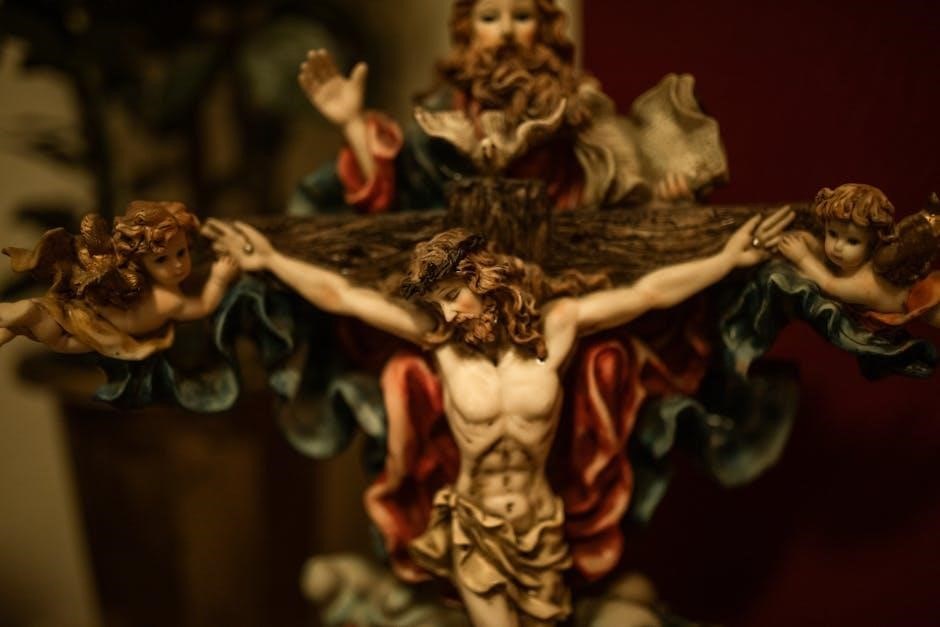The Ten Commandments, revealed by God in Exodus and Deuteronomy, serve as a moral and spiritual framework central to Catholic teachings, guiding believers toward holiness and divine love.
1.1 Historical and Spiritual Significance
The Ten Commandments, rooted in the biblical accounts of Exodus and Deuteronomy, hold profound historical and spiritual significance as divine moral guidelines. Given to Moses on Mount Sinai, they symbolize God’s covenant with His people, establishing a moral framework for living in harmony with His will. Spiritually, they reflect God’s love and desire for humanity’s holiness, serving as a foundation for ethical conduct. In Catholic tradition, they are seen as a pathway to virtue, emphasizing reverence for God and respect for human dignity. Their timeless relevance continues to guide believers in fostering a life of faith, love, and obedience, remaining central to Catholic moral teachings and spiritual growth.
1.2 The Role of the 10 Commandments in Catholic Teachings
The Ten Commandments hold a central position in Catholic moral theology, serving as a cornerstone for ethical living and spiritual growth. They are viewed as a divine gift from God, guiding believers toward a life of love, justice, and holiness. The Catechism of the Catholic Church emphasizes their role in forming conscience and fostering virtue, noting that Christ fulfilled and elevated the Commandments through His teachings. In Catholic tradition, the Commandments are not merely legalistic rules but a pathway to freedom and intimacy with God. They are integral to sacramental life, moral education, and the pursuit of eternal salvation. By following the Commandments, Catholics strive to reflect God’s love and live in harmony with His will, embodying the universal principles of respect for God, self, and others.

Biblical Origin of the 10 Commandments
The Ten Commandments are divinely revealed in Exodus 20:2-17 and Deuteronomy 5:6-21, forming the moral foundation of God’s covenant with Israel and Catholic teachings.
2.1 The Book of Exodus and Deuteronomy
The Ten Commandments are first presented in Exodus 20:2-17, where God directly reveals them to the Israelites through Moses on Mount Sinai. This divine revelation establishes the moral and spiritual foundation of the covenant between God and His people.

In Deuteronomy 5:6-21, Moses reiterates the Commandments to a new generation of Israelites, emphasizing their enduring relevance and divine authority. These passages are pivotal in Catholic teachings, as they underscore the importance of obedience to God’s will and the pursuit of holiness.
2.2 The Catechism of the Catholic Church Perspective
The Catechism of the Catholic Church emphasizes the Ten Commandments as a foundational guide for moral and spiritual life, rooted in God’s love and wisdom. It highlights their role as a divine gift, essential for understanding human dignity and the path to holiness.
In Part Three, Section Two, the Catechism dedicates extensive teaching to the Commandments, presenting them as a moral framework integral to Catholic doctrine. It explains how they reflect the natural law inscribed in every human heart and serve as a pathway to living in harmony with God and others.
The Catechism also connects the Ten Commandments to the Great Commandment of love, underscoring their enduring relevance in guiding followers of Christ to live virtuous lives and fulfill their vocation to love and serve God and neighbor.

The First Commandment
The First Commandment establishes the primacy of worshiping God alone, prohibiting idolatry and false gods, and underscores the foundational relationship between God and humanity, as taught in Catholic doctrine.
3.1 “I Am the Lord Your God; You Shall Not Have Strange Gods Before Me”
The First Commandment, “I am the Lord your God; you shall not have strange gods before me,” establishes the foundational relationship between God and humanity. It emphasizes the exclusivity of worshiping the one true God, prohibiting the acknowledgment or reverence of any other deities. This commandment underscores the Catholic belief in monotheism and the rejection of idolatry in all its forms. It calls believers to place God above all else, fostering a deep commitment to divine sovereignty and trust in His providence. The Catechism of the Catholic Church highlights this as the beginning of the moral life, urging individuals to love God with all their heart, soul, and mind. By honoring this commandment, Catholics affirm their loyalty to God and reject false idols, whether spiritual or material, that might distract from their ultimate allegiance to Him.

3.2 The Prohibition of Idolatry
The Second Commandment extends the First by explicitly prohibiting idolatry, reinforcing the exclusivity of worshiping the one true God. It condemns the creation, veneration, or service of graven images or likenesses of anything in heaven, on earth, or in the water. This includes not only physical idols but also metaphorical ones, such as prioritizing material possessions, power, or desires over God. The Catechism of the Catholic Church emphasizes that idolatry offends God by diverting worship and trust to creatures instead of the Creator. By rejecting idolatry, Catholics affirm their fidelity to God and avoid the spiritual corruption that arises from false devotions. This commandment calls believers to purity of faith, ensuring that their hearts remain undivided in their love and devotion to God alone.

The Second Commandment
The Second Commandment forbids taking the Lord’s name in vain, emphasizing reverence for the sacredness of God’s name and promoting holy and respectful speech in all interactions.
4.1 “You Shall Not Take the Name of the Lord Your God in Vain”
The Second Commandment, “You shall not take the name of the Lord your God in vain,” emphasizes the sacredness of God’s name and prohibits its misuse or irreverent use. This commandment underscores the importance of reverence and respect for the divine, reflecting the deeper spiritual obligation to honor God in thought, word, and deed. In Catholic teachings, this commandment is not merely about avoiding blasphemy or casual swearing but also about fostering a culture of devotion and sincerity in prayer and speech. The Catechism of the Catholic Church highlights that this commandment calls believers to awaken and draw others to the love of God, ensuring that His name is invoked with gratitude, praise, and respect. It serves as a reminder of the transformative power of language and the need to align our words with the dignity of God’s holiness.

4.2 Reverence for the Sacred Name
Reverence for the sacred name of God is central to the Second Commandment, emphasizing the profound respect due to the divine. This commandment calls Catholics to avoid blasphemy, casual swearing, or any misuse of God’s name, which undermines its sanctity. The Catechism of the Catholic Church (2142-2147) explains that using God’s name in vain is a failure to show reverence for the mystery of God’s holiness. It highlights that the name of God is a privileged way of prayer, as seen in the Our Father, and should be invoked with gratitude and praise. Misusing God’s name profanes the relationship between God and humanity, dishonoring the sacred bond established through His revelation. This commandment not only prohibits irreverent speech but also invites believers to reflect on the power and majesty of God’s name, fostering a deeper sense of awe and devotion in their spiritual lives.

The Third Commandment
The Third Commandment, “Remember to keep holy the Lord’s Day,” emphasizes the sanctity of resting on the Sabbath, reflecting God’s rest after creation, as detailed in Exodus 20:8-11 and Deuteronomy 5:12-15.
5.1 “Remember to Keep Holy the Lord’s Day”
The Third Commandment, “Remember to keep holy the Lord’s Day,” is a call to reverence the Sabbath as a day of rest and worship. Rooted in the biblical account of creation (Genesis 2:3) and God’s rest on the seventh day, it reflects the divine rhythm of work and renewal. In Catholic tradition, this commandment is observed on Sunday, commemorating the resurrection of Christ. The Catechism of the Catholic Church (CCC 2170) emphasizes that the Lord’s Day is a day for attending Mass, spending time with family, and engaging in acts of charity. It is a sacred opportunity to deepen one’s relationship with God and reflect on His divine plan. By honoring this day, believers align themselves with the Church’s liturgical life and cultivate spiritual renewal.
5.2 The Sabbath and Its Observance
The observance of the Sabbath, rooted in the biblical account of creation (Exodus 20:8-11), is a sacred tradition emphasizing rest and worship. In Catholic teachings, the Sabbath is celebrated on Sunday, honoring the resurrection of Christ. The Catechism of the Catholic Church (CCC 2170-2177) explains that this day is dedicated to attending Mass, refraining from unnecessary work, and engaging in acts of charity and family bonding. It is a time for spiritual rejuvenation, reflecting on God’s love and mercy. By observing the Lord’s Day, Catholics align with the Church’s liturgical life and fulfill the divine command to sanctify this day. This practice fosters a deeper connection with God and strengthens the community’s faith, mirroring the biblical mandate to rest and worship.

The Fourth Commandment

Honoring father and mother, rooted in Exodus and Deuteronomy, is a cornerstone of Catholic moral teachings, emphasizing respect, obedience, and care for parents as a divine mandate.
6.1 “Honor Your Father and Your Mother”
The fourth commandment, “Honor your father and your mother,” is a divine mandate rooted in Exodus 20:12 and Deuteronomy 5:16. It emphasizes respect, obedience, and care for parents, extending beyond childhood into adulthood. This commandment reflects the importance of family as the foundation of society and the first place of moral and spiritual formation. In Catholic teachings, it is not only about obedience but also about showing gratitude and providing for parents’ needs, especially in their old age. The Catechism of the Catholic Church highlights this as a duty of justice and charity, fostering unity and harmony within families. By honoring parents, individuals uphold God’s plan for humanity and contribute to a culture of love and responsibility. This commandment is also linked to the promise of long life and prosperity, underscoring its universal and timeless value.
Comments